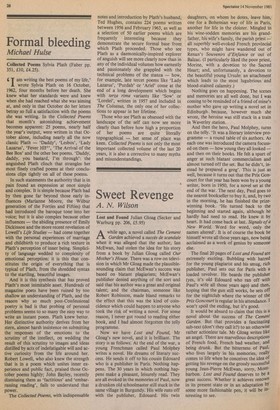Formal bleeding
Michael Hulse
Collected Poems Sylvia Plath (Faber pp. 351, £10, £4.25).
T am writing the best poems of my life,' I wrote Sylvia Plath on 16 October, 1962, four months before her death. She knew what her standards were and knew when she had reached what she was aiming at, and only in that October do her letters betray so full a satisfaction with the poems she was writing. In the Collected Poems that month's astonishing achievement becomes apparent: 25 poems, nearly half the year's output, were written in that October alone, including nearly all the now classic Plath — 'Daddy', 'Lesbos', 'Lady Lazarus', 'Fever 103°', 'The Arrival of the Bee Box' and the other bee poems. 'Daddy, daddy, you bastard, I'm through': the anguished Plath clinch that strangles her most finely crafted poems at their conclusions clips tightly on all of these poems.
In such statements the authority that is in pain found an expression at once simple and complex. It is simple because Plath had by then gone far beyond those early influences (Marianne Moore, the Wilbur generation of the Forties and Fifties) that had introduced the baroque tone into her voice; but it is also complex because other influences — the abiding presence of Emily Dickinson and the more recent revelation of Lowell's Life Studies — had come together with the personal experiences of marriage and childbirth to produce a rich texture in Plath's perception of inner being. Simplicity of language wedded to complexity of emotional perception: it is this that constitutes the origin of everything that is typical of Plath, from the shredded syntax to the startling, beautiful images.
And it is this synthesis that has proved Plath's most inimitable asset. Hundreds of magazine poets have been ruined by too shallow an understanding of Plath, and the reason why so much post-Confessional poetry is bad is that probing of personal problems seems to so many the easy way to write an instant poem. Plath knew better. Her distinctive authority derives from her stern, almost harsh insistence on submitting the responses of the emotions to the scrutiny of the intellect, on wedding the result of this scrutiny to images and ideas distilled by acts of indefatigable will and active curiosity from the life around her. Robert Lowell, who also knew the strength that is in a poem which unites inner experience and public fact, praised those October poems highly; John Bayley, recently dismissing them as 'factitious' and 'embarrassing reading', fails to understand that power.
The Collected Poems, with indispensable notes and introduction by Plath's husband, Ted Hughes, contains 224 poems written between 1956 and February 1963, as well as a selection of 50 earlier poems which are frequently interesting because they demonstrate the secure formal base from which Plath proceeded. Those who see Plath as a daemonically-inspired explorer of anguish will see more clearly now than in any of the individual volumes how earnestly and passionately she grappled with the technical problems of the stanza — how, for example, late tercet poems like 'Lady Lazarus', 'Purdah' or 'Ariel' come at the end of a long development which begins with terza rima variants like 'Sow' or 'Lorelei', written in 1957 and included in The Colossus, the only one of her collections to appear in her lifetime.
Those who see Plath as obsessed with the landscape of the self can now see more clearly than before how high a proportion of her poems are quite literally topographical — her sense of place was keen. Collected Poems is not only the most important collected volume of the last 20 years, it is also a corrective to many myths and misunderstandings.


































 Previous page
Previous page